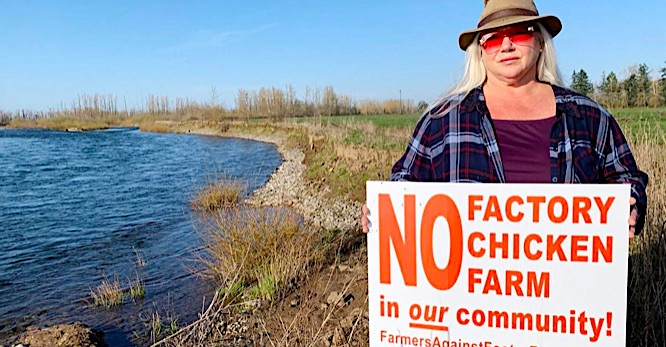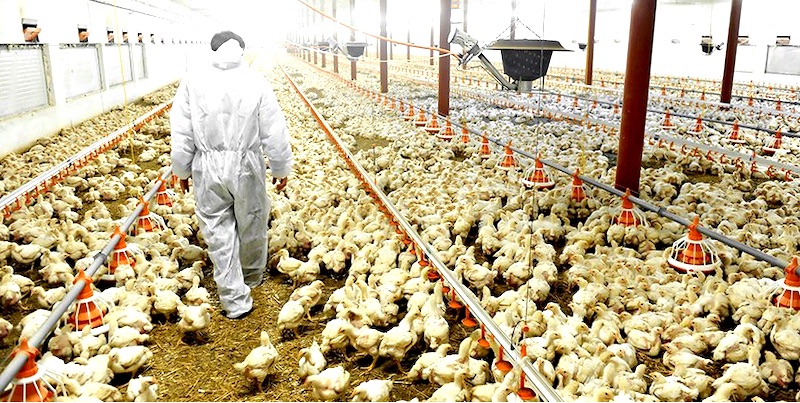
Community Action Shuts Down Proposed Industrial Chicken Factories
It was a scary moment for Oregon. A giant national chicken producer, Foster Farms, was attempting to site three industrial-scale chicken facilities near Salem that would house up to 13 million chickens in notoriously crowded, closed barns.
Just one of those facilities, operated on a contract with Foster Farms by Eric Simon, a longtime poultry farmer in Brownsville, would have included 11 barns measuring nearly 40,000 square feet each—a football field is just over 57,000 square feet—each one containing six flocks of up to 580,000 chickens per year, totaling 3.48 million birds. Simon's J-S Ranch received a permit in 2022 to begin construction of the industrial barns from the Oregon Department of Agriculture (ODA) and the Department of Environmental Quality (DEQ). This was despite strenuous objections from community members and farmers in the area concerned about foul odors and toxic emissions that would threaten water quality, potentially forcing neighboring farms out of business.

Local opposition took the form of an organization called Farmers Against Foster Farms, which joined a coalition of community and environmental organizations against the plants. Amy van Saun, a senior attorney at Center for Food Safety, one of the partners in the fight, said, "ODA and DEQ cannot ignore this mega-chicken operation’s likely pollution of the North Santiam River, a federally protected waterway.”
An article in the Salem Statesman-Journal reported that a petition requesting reconsideration of the permit charged that the facility’s permit only addressed discharges to groundwater but added there was also the potential for discharges to surface water. “This includes aerial deposition of ammonia from chicken barn fans into the river, and runoff of contaminated stormwater,” and argued that four inches of compacted soil in the barns, required by DEQ, was not enough to protect groundwater, saying that other states require as much as 12 inches.
Farmers launched a simultaneous effort at the county level asking Linn Country commissioners to define where Confined Animal Feeding Operations (CAFOs) could be built in the county, requesting change requiring a minimum one-mile setback from property lines on properties where new large CAFO’s may be sited.

In the hearing commissioners heard from constituents about their concerns over protection of drinking water, local rivers, odors, ammonia emissions and proposed facilities being close to a local elementary school and church. One person called the proposed setback a “good guardrail” against the large farming operations owned by hedge funds that make profit a priority over livelihoods of local residents.
"Some of those who testified fought back tears as they talked about their farms, whether they are relatively new to the area, or are living on land owned by their families for five generations," according to a press release from the county. After vigorous debate, commissioners voted for the one-mile setback.
Following the vote by the county commissioners, two of the three factory farms withdrew their proposals, and in April of 2024 the ODA reversed the permit for J-S Ranch ahead of a challenge that was scheduled to go on trial in early May. It was a day for communities to celebrate, helping set a precedent for other communities threatened by industrial agricultural developments.
Photos from Farmers Against Factory Farms' Facebook page.